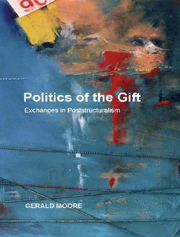Book contents
- Frontmatter
- Contents
- Acknowledgements
- Abbreviations
- Series Editor's Preface
- Introduction: Spectres of Mauss
- 1 Speech, Sacrifice and Shit: Three Orders of Giving in the Thought of Jacques Lacan
- 2 The Eternal Return of the Gift: Deleuze (and Derrida) contra Lacan
- 3 Repeating the Political: Heidegger and Nancy on Technics and the Event
- 4 ‘Pour en finir avec …’: Democracy and Sacrifice
- Conclusion: Variations on a Theme from Nietzsche
- Bibliography
- Index
Conclusion: Variations on a Theme from Nietzsche
Published online by Cambridge University Press: 12 September 2012
- Frontmatter
- Contents
- Acknowledgements
- Abbreviations
- Series Editor's Preface
- Introduction: Spectres of Mauss
- 1 Speech, Sacrifice and Shit: Three Orders of Giving in the Thought of Jacques Lacan
- 2 The Eternal Return of the Gift: Deleuze (and Derrida) contra Lacan
- 3 Repeating the Political: Heidegger and Nancy on Technics and the Event
- 4 ‘Pour en finir avec …’: Democracy and Sacrifice
- Conclusion: Variations on a Theme from Nietzsche
- Bibliography
- Index
Summary
Perhaps we should see the first attempt at this uprooting of Anthropology – to which, no doubt, contemporary thought is dedicated – in the Nietzschean experience. […] Nietzsche marks the threshold beyond which contemporary philosophy can begin thinking again. […] If the discovery of the Return is indeed the end of the philosophy, then the end of man, for its part, is the return to the beginning of philosophy.
(Michel Foucault)Several attempts have been made to discern an underlying thread or unifying thematic of twentieth-century French philosophy. Apparently oblivious to the critique of homo economicus that recent philosophies of the event have entailed, Gary Gutting has located this thread in an overarching ‘concern with individual freedom as a concrete lived reality’ (Gutting 2001: 380), in relation to which ‘poststructuralism is an interlude rather than a decisive turning point in the history of French philosophy’ (2001: 389). Todd May rightly describes the convergence of thinkers around the problematic of difference, particularly in a critique of foundationalism, viewed as a privileging of identity that is not only false but also ‘insidious’ and ‘totalitarian’ (May 1997: 4). Moved by the deaths of Deleuze and Derrida amongst others, not to mention the then serious illness of Nancy, Badiou writes nostalgically of an ‘exceptional […] French philosophical moment’, seeing himself as ‘perhaps its last representative’ (Badiou 2005b). Stretching broadly from Sartre to Deleuze, this moment is characterised by interrogations of the human subject and the legacy of nineteenth-century German philosophy, as well as science, psychoanalysis and a desire to ‘situate philosophy directly within the political arena without taking a detour via political philosophy’ (2005b [TM]).
- Type
- Chapter
- Information
- Politics of the GiftExchanges in Poststructuralism, pp. 193 - 200Publisher: Edinburgh University PressPrint publication year: 2011

